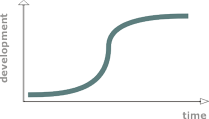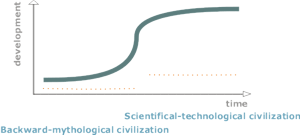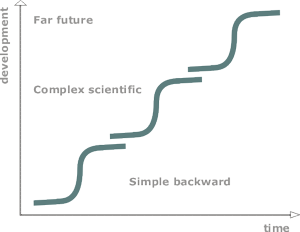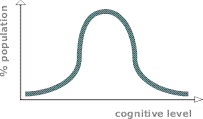Sociological theory
1. Well, I assume that God exists. He extends over space where there would be a higher vacuum (vacuum above the cosmic vacuum) and includes the planetary system, above all the Earth and the Sun. Christ was one of his incarnations.
2. Division of sociology seizes aspect evolutional, structural, systematical and cultural. From the point of view of biology, sociology is a domain investigating population, particularly human population. Its purpose is to build general theory of this population on three levels macro, mezo and micro as contrasted to detailed theories, political science, economical, historical etc. So its field can be differentiate from other social sciences as political science, economy, cultural anthropology, ethnography, history, cultural studies etc.
Creator of sociology A.Comte developed one from firsts modern theory of science. Main domains - astronomy and mathematics, physics, chemistry, biology, sociology - today at next place we can add psychology, he ordered according to the diminishing degree of the generality - diminishing range, from astronomy to sociology, to which accompanies the growth of the complexity of investigated phenomenones. Whereat every domain previous following determines for its indispensable base. From this theory results clearly that sociology investigates most complexity phenomenones and needs proper methods but strongly analogical to methods of physics or biology. The antinaturalistic sociology being expression of unripeness transfers sociology into a sphere of pseudoscience and rubbish.
As biology come its own generally obligatory paradigmatic theory which is theory of evolution, similarly became with sociology. Thus levering of the importance of theory of evolution aground of sociology is similar to levering the importance of theory of evolution aground biology. Both undertakings are in the same way nonsensical and unscientific.
3. Models are a basic component of the scientific explanation and one of bases for building of a theory. It is worth to notice that organicism or organic analogy was a model and not an metaphor. For a development of culture biomorphotical model (from biomorphosis - human life cycle) seems to be useful - similarly as in a field of physics a good model of a structure of atom it proved to be a planetary system. Last period of development of civilization had impetuous character. What corresponds with biomorphotical model but only in its more exact kind. We can say that phases of the mind of a man correspond to the epochs of the mind of the society but partition on phases childhood, youth and adulthood isn't fully precise.
It is known that adulthood phase is preceded by a period of ripening, following after a period of childhood. Just in this period we are found at present. It have started not long ago, about year 1700 and characterize it accelerated and even impetuous development, demographic, civilizational and technical.
Applied effectively in my general theory of evolution (see map of my research)
logistic development (diag. 1) is best fitted for its description. Till now unsolved problem what means that stormy social development can find a clear explanation aground of proposed theory.
 diagram 1. Logistic development
diagram 1. Logistic development
4. In first period dominated fictitious and delusional representations. Which anyway till today kept the vitality. Still at the beginning the twentieth century came into being the theosophical sect proclaiming the existence of elves, gnomes, and sylphs. Still alive astrology is the same what a divination from scattered animal bones - so from an aleatorily obtained configuration, function of bones fulfil planets; "accuracy" comes from inaccuracy of used categories which each separately can contain any property or notion. Of course, information value of such "method" must be equal zero.
 diagram 2. Ripening of civilization. You can also put a backward culture at the bottom of the curve and a technical culture at the top of the curve.
diagram 2. Ripening of civilization. You can also put a backward culture at the bottom of the curve and a technical culture at the top of the curve.
I would also like to consider another hypothesis. God encompasses the planetary system, so some version of astrology may be applicable. As for the zodiac, it wouldn't apply. The same applies to the houses of the horoscope. And the same goes for most aspects. Of the aspects, only the conjunction remains. The meanings of the planets have yet to be worked out, although some familiar interpretation could be used. The conjunction of the planets, the Sun and the Moon with the Ascendant or Medium coeli would matter. As for predictive astrology, directions and progressions do not apply. Perhaps only transits, through conjunctions, count.
5. General civilizational megaevolution is leading from simple backward culture to complex cosmical culture. It consists of three main subprocesses connected with three types of civilization, dependently from their cosmic range:
 diagram 3. Sociomegaevolution
diagram 3. Sociomegaevolution
- Type I, planetary, is connected with transition inside simple backward culture, about 10000 BC
- Type II, civilization which is entering in interplanetary space, is connected with transition from simple backward culture to complex scientific culture, present and future time
- Type III, which is entering in interstellar space, far future
6. Psychology can appear as domain extremely helpful for build of sociological theory.
If because in psychology must prevail cognitive paradigm then also as same must be in sociology, because social processes are resultant of individual processes. Thus society can be seized as system of transmission of data, informations, knowledge, cognition. Completed by transmission of consumer goods, effects of production, money, interpersonal and emotivic relations. It is worth to see that a notion of system is here understood unlike in hitherto existing sociological theories. In society occur cognitive processes, such as learning, remembering, creativity which an expression is Culture.
It is possible divide in society in fact three societies, society let us call it cognitively exclusive, society cognitively medial and society cognitively poor. Such divide however does not overlap on other kinds of social stratification, such as stratification of the wealth.
In statistics logistic model connects with normal distribution model which is perfectly fitted to describing of social structure.
 diagram 4. Sociostructure
diagram 4. Sociostructure
7. The most fundamental property of the whole population is development or evolution. The culture or civilization develops as well as the population itself. The second most fundamental property of the whole population is its structure. The population is ordered. It is possible to order the population, for example, through the ownership of financial resources, i.e. through wealth. The third most fundamental property of a population is its numerical size. The fourth most fundamental property of population is that it constitutes a culture. The fifth most fundamental property of a population is its level of development.
In my theory, I use the logistic jump model to describe population evolution. Where the old population is replaced by the new, both in culture, where a backward culture is replaced by a technical one, and in the population itself, where completely new members of society appear alongside the old incarnations. To describe the structure, I use the normal distribution model, where I order the population in terms of cognitive level. As for size, the logistic jump model seems to best describe the process of population growth. And here again the old, small population is replaced by a new, very numerous population. As for the culture, the old backward culture has been replaced by a new technical one. As for the level of development, four basic levels can be distinguished. Backward, technical, developed technical and highly developed technical culture. There are cultures of varying degrees of development in the cosmos, including developed and highly developed technical cultures. Our culture is technical culture.
8. Regarding Marx, about falseness of his conception should testify so called prognoses of Marx concerning future which would have completely to pass with reality. Bankruptcy of cretinous communist systems have showed emptiness of Marxism and boundlessness of stupidity of these which decided thoughtlessly come after Marx. And it was a wide social phenomenon. Still today Marx finds supporters and continuators also in academical environments - fundamental assumption of so called theory of conflict is erroneous, because not conflict but cooperation (solidarity) is base of society. Without it it would not be able arise or exist.
Regarding Weber, the theory on the subject of rising of capitalism seems wrong.
Firstly notion of the capitalism itself which uses Weber is doubtful. Was introduced by Marx, within the framework of his unripe theory. Instead of the notion of the capitalistic society, often is using better notion of industrial society. If we will use this notion then axled will be problem of rising of industry, and for this base determine a development of technics and machines, where axled meaning had an invention of steam engine. Thence a base of development of capitalism in decisive phase was development of technics.
9. Nota bene other "known" German can soon have "a significant" influence on social phenomena. One can believe or not into theory of reincarnation, but for my money this is one from religious conceptions which is valid - of course after certain and pretty thorough corrections, for example conception of karma is in big degree a superstition. Now in years 2030-2060, it can be expected following public activity of A.Hitler. This information can appear insomuch important that probably he will lead to unleashing of nuclear war, what predictably will cause annihilation of biosphere (more in my text Return of a big danger...).
10. Characteristics of extended theory of evolution of Herbert Spencer, presents as follows - process of evolution is an integration of matter, whereat matter passes from a state of undefined, incoherent homogeneity, simplicities, primordialities, physicalnesses, unformed, amorphisms, undimensional, uniformity, homomorphism to a definite, coherent heterogenicity, complexities, modernities, cultural, formation, construction, dimensionality, variousness, polymorphism. This seizure of process of evolution has a polycomplex character.
11. Marxism's errors consist in the fact that 1. The final development is the middle class, not the working class 2. A process of qualitative transition is not necessarily and usually not revolutionary. Even a demographic boom with a growth rate of 2% per year is not revolutionary but evolutionary. Against the background of previous development, it seems very fast, but only because that one was very slow. Therefore, if changes are needed, they should be endeavor gradually, though dynamically reaching them finally 3. Any so called qualitative change - for example, the transition of water into ice, or steam into water - is actually a cumulative quantitative change; that is, a quantitative change taking place quickly over a short period of time (compare logistic development).
12. As I have already noted, conflict theory is incorrect. Because cooperation is the foundation of society, without it it could not arise or exist. As intelligent beings, we should strive for agreement and cooperation, which seems rationally justified. This approach can be called The Theory of Rational Cooperation. For example, education based on the student-teacher relationship involves mutual cooperation between both parties, in the event of a conflict, the education process becomes impossible. Parts of the social system work together, which is the basic property of the system. The benefit and loss account is favorable for cooperation, unlike the conflict where losses prevail. Cooperation is the basis of social order. As can be seen, reason, and therefore the cognitive powers decide about the ability to cooperate, and therefore the superior theory relative to the theory of rational cooperation is cognitive theory. However, the assumptions of conflict theory are fundamentally wrong.
13.
Sociologism (term coined by me) - all sciences, their terms and claims can and should be reduced to sociology. On the one hand, the simplification of science leads to physicalism, and on the other, their complication leads to sociologism.
14. In 2015 Japanese scientists sent 1.8 kilowatts of electricity using microwaves over a distance of 55 meters. Also Japanese scientists from JAXA (Japanese Space Exploration Agency) assume that around 2040 it will be possible to send electricity from Earth's orbit. What I would like to note is the fact that in the distant future it will be possible to send electricity directly from the Sun through wireless channels.
15. If we want to define the era following modernism, instead of using the term postmodernism, we should use the term
ultramodernism, which I coined. The era, which can be dated from the year 2000, under my logistic analysis (compare point 2) can last for many thousands or tens of thousands of years.
16. I consider the entire human population in my previous and current considerations. It can be assumed that there is a global culture with some territorial differentiation. Over the past centuries, this culture has gained previously unknown properties. Among other things, the subjugation of electromagnetism and electricity turned out to be key.
Thanks to electricity, it was created as if a new population brain in which communication, like in an ordinary brain, is based on the flow of electricity. The scope of social communication has developed enormously thanks to, among others, radio, television, telephony and the Internet. It is worth noting that the brain model is similarly suitable for describing the older population, except that the brain of this population was less developed. In addition, planetary culture is undergoing globalization, or homogenization, some unification and equalization across the globe. From these considerations, the concept of population as a brain emerges.
It is worth noting here two circumstances, one is the fact that the
brain model perfectly agrees with the cognitive theory of the population, if we assume that the model under consideration is the human brain, because in the human brain cognitive processes prevail. The second is that network concepts fit the brain model very well.
For Culture's memory are primarily responsible its products such as books, and now also data carriers. And so on.
The concept of social brain agrees well with the concept of three subpopulations presented earlier. All manual workers, like the brainstem, are responsible for the vital functions of the population. Intelligentsia in turn, like the cerebral cortex, for the cognitive functions of the population. Intermediate layer for intermediate functions. Intelligentsia, due to the fact that it is responsible for the cognitive functions of the social system, seems in a sense much more important than manual workers, just as the cerebral cortex is in some sense more important than the brainstem.
For my cognitive theory, the analysis of the
neural network turns out to be crucial.
In addition to the brain model, a model of the cerebral cortex should be considered. The cortical model would agree with the size of the population at the end of the logistic jump, since the number of cells in the cerebral cortex is about 10 billion. The cortical model also agrees with network concepts.
The brain model and cortical model appear to be justified by Comte's theory of science, in which biology is the basis for sociology, and from which the latter science can draw key models for itself.
17. The basic property of a social system is learning. Knowledge as such is practically social, without social interaction knowledge is almost impossible. It boils down to the existence of mainly books, and today also to such media as the Internet. So the social system learns practically everything. On this path, among others, science was created and developed. As part of the system under study, communication takes place that comes to language, whether spoken or written.
Other important properties of the social system are generalization of experience, adaptation, information processing and recognition. Data analysis in the social system makes it possible to determine the causes of failures of specific projects undertaken in the past, thanks to which it is easier to avoid mistakes in the future. There are ten properties of our social cognitive system:
1) evolution
2) structure
3) numerical size
4) culture
5) level of culture
6) intelligence
7) memory
8) language
9) knowledge
10) learning
I discussed p. 1-5 earlier. Intelligence for Intelligentsia is heightened. 95 percent of the population has an intelligence in the 70-130 IQ range. For culture's memory are responsible its products such as books, and now also data carriers. The property of memory is related to the science of history. Language is spoken or written. Where the English language has the greatest influence today. Knowledge is mainly collected by Intelligentsia. Learning was discussed earlier.
18. In addition to industrial production,
consumption is an equally important concept. We distinguish primarily market - goods consumption that occur when the consumed goods come from the market, so they were bought by the consumer. In addition, it is also worth mentioning about social consumption when the goods consumed are financed from public funds, as an example can be the use of public library collections.
19. Apart from the industrial revolution, the French revolution and the sometimes mentioned urbanization, there are also other phenomena of key importance from the point of view of sociology from the last centuries. It will be respectively a scientific revolution started with the work "On the Revolutions of the Celestial Spheres" and a technical revolution, for which the invention of the steam engine was crucial and the formation of the United States of America. It will be quite right to note that we currently live in a society steeped in science and technics with significant USA influence on a global scale.
20. From the point of view of the cognitive paradigm, the flow of information seems to be one of the key issues. In the twentieth and twenty-first centuries there has been an improvement in the flow of information in the modern population compared to the old population, thanks to technological advances. Starting from radio, through television and ending with mobile telephony and the Internet. When the old population had only written script and oral communication. These achievements of the modern and ultramodern population were made possible by the mastery of electricity and electromagnetism. The described development is associated with a significant increase in the cognitive abilities of the population.
21. In modern research, only a new population is considered, which has arisen over the past centuries. This approach does not describe an old population that has existed for thousands of years, but a new one that has arisen recently, as if this new population has existed for a very long time when it is not. It is worth noting that studies of the contemporary population sin the inevitable provisional nature of their results, due to the fact that they capture a new population in the process of its formation only, and not in a structurally permanent state. So a new population is just taking shape, which may take some time, though centuries have passed, and the hint of Gould and Eldredge's concept in biology, where the emergence of a new biological species is taking several centuries, shows that this process is probably about to end.
22. In biological microevolution, a sigmoid-based mechanism works when a certain population is transformed into another population - one species into another. An appropriate mechanism also based on a sigmoid also works in the social area and interestingly it actually transforms the population into another population, the biological species does not change but the social species changes (the backward one changes into technical), the emergence of a modern society can be compared to the emergence of a biological species. With the fact that sociology is limited to only one biological species, while the old social species disappears, a kind of society, and a new one appears. It is a change of species, the old social species ceases to exist, the old population and a new social species emerges, a new population. One social species over the centuries changes into another, hence if that one has existed for thousands of years then this one will also exist for thousands or tens of thousands of years.
23. Among the highest subpopulation, an elite consisting of scientists, artists and writers can be distinguished. Science is the highest type of cognitive activity in the population. Apart from that, art has its own meaning. And among scientists, one can distinguish one more elite consisting of outstanding scientists. They decide on the shape of science and constitute the highest elite group in the entire population. Apart from outstanding scientists, such an elite also includes outstanding artists and writers.
24. With reference to paragraph 17, taking into account the property of the intelligence of the human population, along with the development of civilization, according to the sigmoidal model, there was a clear increase in the level of intelligence of the population. It is enough to mention here the spread of education, which actually covers the entire population. Today's ability to read and write is not unique, but it was not so in the old prejump population. The
transition from illiteracy to education should be considered one of the essential features of the development of the last few centuries.
25. Logistic development also used in my theory of biological evolution and gigaevolution (see my text New theory of evolution) proves that the same laws apply to social as well as biological phenomena. This is evidence for naturalism in sociology.
26. The Gaussian curve (a normal distribution) has found its application in psychology. So far, it has not been used in sociology, except for statistics. As it turns out, it can take a prominent place in sociological theory, which is a great novelty. However, the use of the logistic curve - to describe social evolution - seems revolutionary, and is even greater novelty. The formulation of the cognitive sociological theory, theory of cooperation and the use of the brain model and the neural network are also a big novelty.
27. It is worth to notice that presented by me theory creates
homogeneous cognitive sociological theory.
(p.2-9,27-year 2008, p.10-13-year 2019, p.14-17,21-year 2020, p.18-20-year 2021, p.22-25-year 2022, p. 1,7,26-year 2023)
Gregory Podgorniak, Poland




